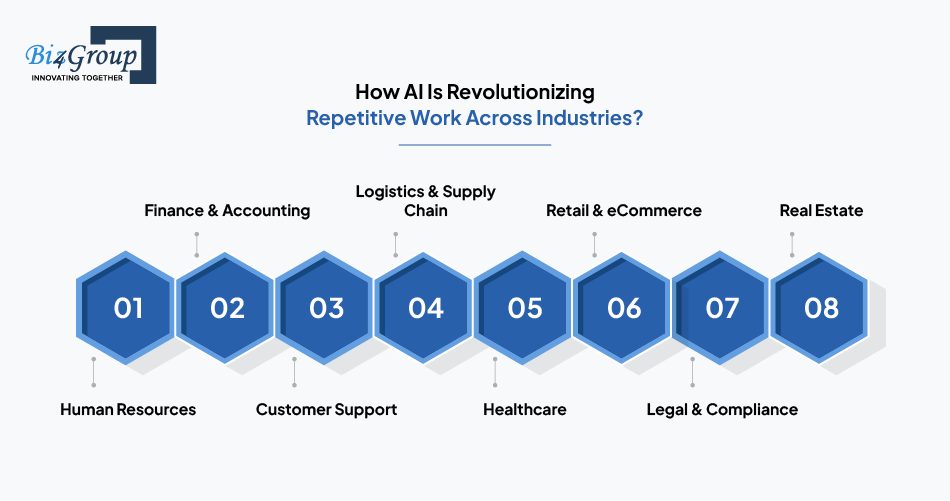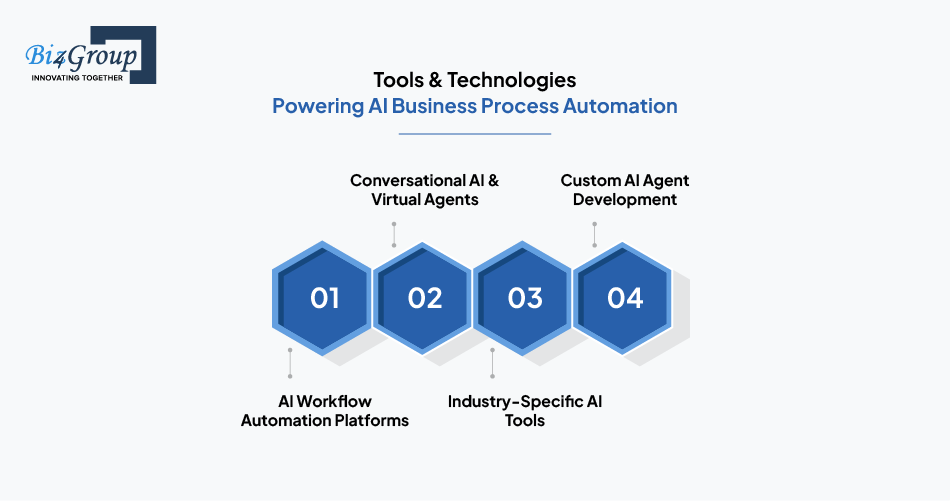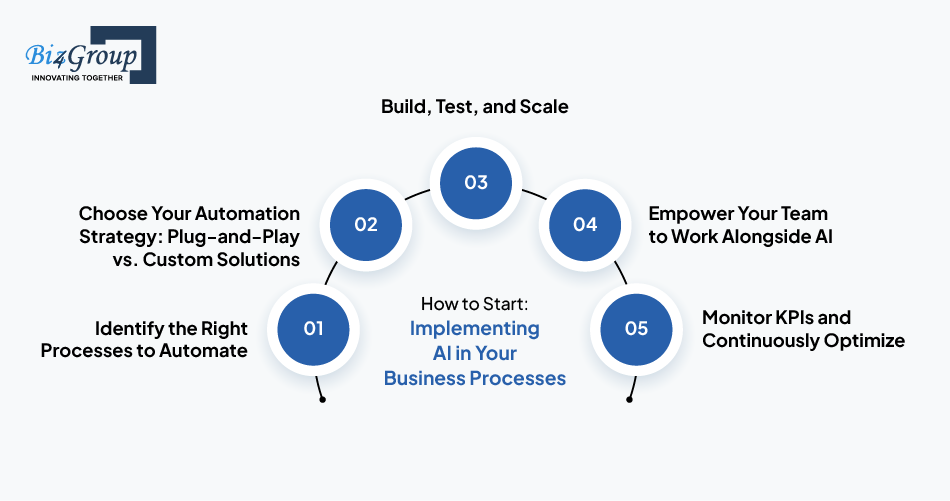Basic AI Chatbot Pricing: A simple chatbot that can answer questions about a product or service might cost around $10,000 to develop.
Read More

TL; DR

AI can automate up to 70% of repetitive business tasks, freeing your team to focus on strategy, innovation, and decision-making.

AI business process automation goes beyond rule-based workflows—adding intelligence, adaptability, and self-learning capabilities.

From HR and finance to healthcare, logistics, and legal, AI is reshaping how entire industries operate.

Tools like UiPath, Power Automate, and custom-built AI agents enable scalable and flexible automation across departments.

Businesses that adopt AI automation report 20–30% cost savings, up to 80% error reduction, and significant productivity gains.

You don’t need to start big—pilot projects and plug-and-play platforms can help you test the waters and scale gradually.

AI business process automation is suitable for companies of all sizes—from lean startups to large enterprises.

The future is AI-driven: workflows are evolving from manual to intelligent, giving businesses a lasting competitive edge.
If your team is drowning in a sea of spreadsheets, manual follow-ups, repetitive emails, and data entry—you’re not alone. From HR to operations, businesses of all sizes struggle with tasks that are tedious, time-consuming, and frankly, soul-draining.
But what if 70% of those repetitive tasks could be automated?
Enter: AI business process automation—your team's new secret weapon.
AI is no longer limited to futuristic sci-fi scenarios. It’s being used right now by smart companies to automate workflows, improve efficiency, and let employees focus on what really matters: strategy, innovation, and human connection. Whether it's onboarding employees, responding to support queries, processing invoices, or qualifying leads, AI for business process automation is transforming how modern companies operate.
In this blog, we’ll break down:
By the end, you’ll understand not just how it works, but how to apply it to your own workflows for immediate, measurable gains. Because in 2025, business process automation with AI isn’t optional—it’s a competitive edge.
Before diving into tools and industry use cases, let’s start with the basics—what is the role of AI in business process automation?
At its core, business process automation (BPA) is the use of technology to perform recurring tasks or processes in a business where manual effort can be replaced. Traditionally, BPA relied on rigid rules and workflows—but it lacked flexibility, learning ability, and real-time decision-making.
That’s where AI in business process automation changes the game.
AI introduces a layer of intelligence and adaptability. It doesn’t just follow rules—it learns patterns, analyzes data, makes predictions, and improves itself over time. This means businesses can move beyond simple task automation and start optimizing entire workflows.
Modern AI agents are capable of automating decision points—not just the tasks around them. If you're curious about how they work behind the scenes, check out our guide on how to build an AI agent.
Together, these technologies create a foundation for AI for business process automation that is smarter, faster, and significantly more scalable than its predecessors.
So when we talk about AI-powered business process automation, we’re not just talking about cutting costs—we’re talking about empowering businesses to become more agile, data-driven, and future-ready.
Free your team from manual tasks using intelligent automation.
Start Automating Today
In the fast-paced digital economy, repetitive manual tasks are draining productivity, causing burnout, and slowing growth. Across industries, businesses are turning to AI business process automation to relieve teams from this burden, drive performance, and scale intelligently.
Below are real-world ways AI for business processes automation is reshaping core operations across multiple sectors:
From screening resumes to automating onboarding flows, HR departments are saving hundreds of hours per month with AI. Virtual assistants can answer policy questions, approve leaves, and route complex requests.
AI’s impact is well-documented in HR transformation. Companies are increasingly deploying intelligent solutions that reflect the growing potential of AI in HR to streamline talent acquisition and people ops.
Also Read: Multi-Agent AI Systems
AI is powering everything from ledger updates to anomaly detection in real-time. One critical use case? Fraud detection—where AI models analyze transaction patterns and flag suspicious claims.
Insurers are investing heavily in AI insurance fraud detection to reduce investigation times and eliminate billions in false claims annually.
Gone are the days when agents handled every query. Intelligent bots now manage common requests, escalate only when needed, and personalize interactions. This is where AI agents for business process automation truly shine—handling volume at scale with unmatched efficiency.
Firms offering customer service AI chatbot solutions help businesses build conversational tools that resolve queries 24/7 without burning out human agents.
Also Read: Best AI Agents
Delivery tracking, inventory management, and fleet communication have traditionally involved manual coordination. Today, logistics teams are powered by intelligent bots that optimize routes and keep customers updated in real-time.
In fact, AI chatbots in logistics are becoming essential for operational transparency and delivery efficiency.
AI is bringing relief to overburdened healthcare admins. From patient onboarding to claims processing and appointment scheduling, AI powered business process automation improves turnaround and reduces errors.
For example, providers are exploring AI solutions for healthcare to automate repetitive clinical and non-clinical tasks. And with advancements in virtual care, the cost to develop an AI healthcare assistant is now within reach for mid-sized practices too.
Also Read: AI in Healthcare Administration Automation
AI assists with product categorization, personalized upsells, and automated customer service. It also helps monitor stock, trigger reorders, and manage dynamic pricing based on demand.
Businesses planning to scale their platforms are factoring in ecommerce mobile app development cost early to ensure intelligent automation is baked into the backend from the start.
Also Read: Chatbot in eCommerce
Legal teams are using AI business process automation to handle contract drafting, risk analysis, and document review. NLP-powered tools extract clauses, flag inconsistencies, and offer revisions—all without human fatigue.
Those seeking workflow-centric solutions are exploring legal consulting app development for automating repetitive legal tasks securely and compliantly.
Lead qualification, data entry, and appointment scheduling are now managed by AI, allowing real estate agents to focus on closings and client relationships.
Modern brokerages are investing in AI real estate solutions to automate property management and CRM flows. Companies looking to digitize their portfolios also see value in AI in real estate development strategies backed by predictive analytics.
Complementary services like real estate web development make this transformation seamless from both backend and UX standpoints.
Also Read: AI Chatbots in Real Estate
Whether it’s automating a chatbot, processing invoices, or optimizing logistics, AI-enabled business process automation is turning once-laborious tasks into efficient, self-operating systems. It’s not just about cutting costs—it’s about scaling smarter, improving accuracy, and delivering faster.
Custom AI agents designed to handle business processes autonomously.
Get a Free Quote
Implementing AI business process automation doesn’t require building everything from scratch. Today, a powerful ecosystem of tools and platforms makes it easier than ever to integrate AI into your workflows—whether you're a startup optimizing internal processes or an enterprise transforming operations at scale.
Below are the core categories of tools driving AI-powered business process automation, along with examples and real-world capabilities.
These platforms combine rule-based automation with AI-powered decision-making. They're ideal for orchestrating end-to-end workflows involving multiple apps and data sources.
Popular tools include:
AI chatbots and voice assistants can now handle tasks beyond basic Q&A—think appointment booking, task routing, even CRM updates. These AI agents not only reduce manual interaction but improve the user experience with faster responses.
Businesses seeking tailored conversational workflows are leveraging chatbot development services that integrate NLP, sentiment analysis, and back-end automation for a seamless support system.
Industries like healthcare, logistics, and legal are adopting AI platforms built specifically for their needs. These tools often come with domain-trained models, compliance support, and integration hooks for existing software.
For example, AI tools in healthcare now combine appointment scheduling with insurance verification, while in finance, intelligent systems handle compliance documentation and audit trails.
Companies with unique workflows or high-volume automation needs are increasingly building custom agents from the ground up—designed to operate autonomously or with minimal human intervention.
If your business is exploring this route, it’s helpful to understand the AI agent development cost, which varies based on complexity, use case, and integration depth.
For those not sure where to start, working with an experienced AI consulting company ensures scalable, secure, and ROI-driven solutions that align with long-term business goals.
AI-enabled business process automation is no longer a future trend—it’s an accessible, practical upgrade for today’s operations. Whether you choose plug-and-play tools or go fully custom, the technology stack is ready—you just need to take the first step.
Get expert guidance on identifying automation-ready processes.
Book a Free ConsultationFor business leaders considering AI business process automation, the question isn’t if it works—it’s how well. From operational savings to improved accuracy and employee productivity, the return on investment (ROI) from AI automation is both measurable and compelling.
Let’s break down what the data—and real businesses—are saying in 2025.
Imagine your customer support agents save 3 hours a day by letting an AI chatbot triage routine queries. Or your HR manager no longer spends Mondays manually reviewing applications because an AI agent has already shortlisted top candidates.
Now scale that across departments, and you're looking at hundreds of saved hours every month—which translates directly into operational cost savings and faster turnaround times.
One of AI’s biggest advantages in process automation is precision. Unlike humans, AI doesn’t get tired or distracted, which means fewer mistakes in data processing, contract reviews, or customer communication. This is especially valuable in sensitive industries like finance, legal, and healthcare.
Companies building custom agents are seeing excellent returns when they develop tailored systems for niche use cases. Our curated AI case studies show how businesses in various verticals are using AI to save time, reduce costs, and gain a competitive edge.
Here’s the hidden ROI: morale. Employees freed from repetitive, low-value work are more focused, motivated, and able to contribute in strategic areas. AI doesn’t replace jobs—it enhances them by removing the mental load of the mundane.
AI solutions for business process automation are not just scalable—they're profitable. If you're looking for a clear business case, the numbers speak for themselves: AI saves time, reduces costs, and enables smarter decision-making across the board.

By now, the value of AI business process automation should be crystal clear. But for many businesses, the big question isn’t why—it’s how. The good news? You don’t need to overhaul your entire operation overnight to get started. With the right approach, AI can be integrated incrementally, minimizing disruption while maximizing value.
Here’s a simple roadmap to guide your AI-powered automation journey:
Start by mapping out your daily workflows. Look for tasks that are:
Common candidates include data entry, invoice processing, employee onboarding, ticket routing, and reporting tasks.
This phase is key to effective AI automation and business process optimization, ensuring you're not automating inefficiency—but transforming it.
Some businesses prefer low-code platforms or pre-built integrations, while others opt for fully customized AI agents tailored to their niche operations.
If you're just starting out, consider modular platforms. For more specialized workflows, partnering with companies offering AI solutions for business process automation will ensure your systems are aligned with both technical and business goals.
Pilot projects are a great way to validate automation in action. Select one process, implement AI, monitor performance, and gather team feedback.
After success in a smaller scope, you can scale gradually across departments—ensuring change management and team training keep pace with tech deployment.
Businesses interested in a custom build often collaborate with solution partners experienced in AI development to deploy enterprise-grade tools and digital agents tailored to their needs.
One of the most overlooked components of AI implementation is human adoption. Clearly communicate the benefits, provide training, and show how AI will help—not replace—your team. The goal is augmentation, not substitution.
Track metrics like:
AI isn’t a set-it-and-forget-it tool. It thrives when continually trained and improved—especially when supported by a clear performance framework.
Implementing AI-enabled business process automation doesn’t have to be complex. Start small, learn fast, and scale smart. With the right strategy and partners, your business will move from reactive to predictive—and from manual to intelligent.
We’re living in an era where speed, accuracy, and adaptability define business success—and traditional workflows simply can’t keep up. Whether it’s HR, customer service, logistics, or finance, AI is no longer a futuristic luxury—it’s the engine driving modern business processes.
As we've seen throughout this blog, AI-driven business process automation solutions do more than just execute tasks. They learn, adapt, and evolve—bringing intelligence into every corner of your operations. From reducing errors and turnaround times to freeing up employees for high-impact work, the benefits are tangible and transformational.
And this is just the beginning.
We’re already witnessing the next wave of intelligent systems—multi-agent AI models that collaborate across departments, predictive bots that anticipate business needs, and self-healing automations that fix issues in real time.
Forward-thinking businesses aren’t asking, “Should we adopt AI?”—they’re asking, “What’s next?”
If your organization still operates on manual workflows or fragmented systems, now is the time to modernize. Start by evaluating areas where automation can bring immediate ROI, then scale with purpose. With the right tools and strategy, your operations can shift from reactive to proactive—and your team from overwhelmed to empowered.
Looking to explore emerging innovations? Dive deeper into the world of intelligent collaboration with our article on multi-agent AI systems to see where this tech is headed next.
Implement AI business process automation that grows with your business.
Scale with AIEven with the growing adoption of AI business process automation, many business leaders still have lingering questions—and rightfully so. Implementing AI across workflows is a strategic move, and clarity matters. Below are some of the most relevant, yet not already covered, questions about AI-powered automation.
No. AI is best used to augment human roles, not replace them. It handles repetitive, rule-based tasks, freeing up employees to focus on strategic, creative, or interpersonal work. Think of AI as a highly efficient assistant—not a replacement.
Common concerns include data security, biased algorithms, and over-automation. These risks can be mitigated by selecting trustworthy vendors, implementing governance policies, and ensuring humans remain part of decision loops for sensitive tasks.
That’s where AI shines. Unlike traditional automation, AI uses machine learning to recognize patterns and adjust when an exception occurs. It can flag anomalies or even reroute tasks for human approval when needed.
Not necessarily. Many companies partner with experienced AI agents development companies in USA that specialize in custom automation builds and deployment. Outsourcing expertise can accelerate results and reduce the learning curve.
It depends on the complexity of the process being automated. However, most businesses see ROI within 3–6 months after implementation, especially when automating high-volume or error-prone tasks.
AI is highly scalable and can benefit businesses of all sizes. Startups often benefit even more by streamlining lean operations and reducing the need for large support teams early on.
Yes. Most modern AI for business process automation tools offer APIs and connectors that integrate smoothly with CRMs, ERPs, HRMS, and other platforms, enabling seamless automation without overhauling your tech stack.
If your processes are standard or similar to industry-wide functions, plug-and-play tools work great. But for complex, niche, or cross-functional workflows, building a custom AI agent may deliver greater flexibility and ROI.
IN YOUR BUSINESS FOR FREE
Our website require some cookies to function properly. Read our privacy policy to know more.